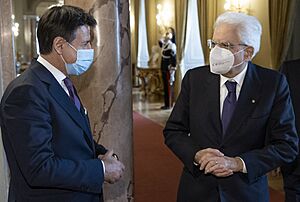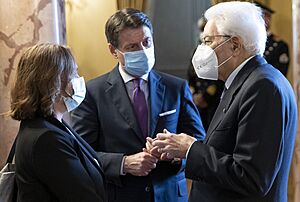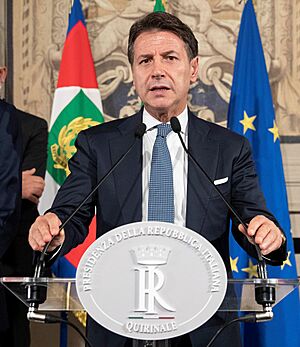Giuseppe Conte facts for kids
Quick facts for kids
Giuseppe Conte
|
|
|---|---|
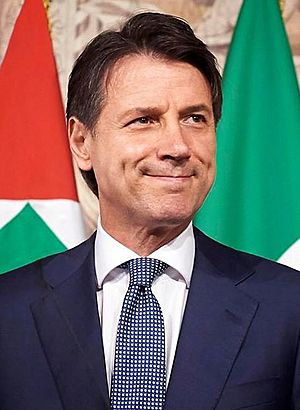
Official portrait, 2018
|
|
| Prime Minister of Italy | |
| In office 1 June 2018 – 13 February 2021 |
|
| President | Sergio Mattarella |
| Deputy | Luigi Di Maio (2018–19) Matteo Salvini (2018–19) |
| Preceded by | Paolo Gentiloni |
| Succeeded by | Mario Draghi |
| Leader of the Five Star Movement | |
| Assumed office 6 August 2021 |
|
| Preceded by | Vito Crimi (acting) |
| Member of the Chamber of Deputies | |
| Assumed office 13 October 2022 |
|
| Constituency | Lombardy 1 |
| Personal details | |
| Born | 8 August 1964 Volturara Appula, Apulia, Italy |
| Political party | M5S (since 2021) |
| Other political affiliations |
Independent (before 2021) |
| Spouse | Valentina Fico (div.) |
| Domestic partner | Olivia Paladino |
| Children | 1 |
| Education | Sapienza University |
| Signature |  |
Giuseppe Conte (born 8 August 1964) is an Italian politician and professor. He served as the prime minister of Italy from June 2018 to February 2021. Since August 2021, he has been the leader of the Five Star Movement (M5S) political party.
Before becoming prime minister, Conte was a professor of private law. He had never held a political job before. After the 2018 Italian election, he was chosen to lead a government formed by two parties: the M5S and the League. He became prime minister on June 1, 2018.
In August 2019, the League party decided they no longer supported the government. Conte offered to resign. However, the M5S and the Democratic Party formed a new government, and Conte remained prime minister. This made him the first prime minister to lead two different Italian governments with partners from both the right and left sides of politics.
During his time as prime minister, Conte introduced important changes. These included a guaranteed minimum income for people in need. He also worked on a plan to reduce the number of politicians in parliament. His government took control of some large companies, like Italy's highway company and the national airline.
In 2020, Italy was one of the first countries hit hard by the COVID-19 pandemic. Conte's government was the first in the Western world to put the entire country on a national lockdown to stop the virus. This was a big step, and while many people supported it, some also saw it as a major restriction on people's freedoms.
In January 2021, a political party called Italia Viva stopped supporting Conte's government. Even though he won votes of confidence in parliament, he chose to resign. After this, Mario Draghi, a former head of the European Central Bank, was asked to form a new government.
Conte was the fifth prime minister in Italy's history to be appointed without previous political experience. He was also the longest-serving independent prime minister. He is sometimes called "the people's lawyer" because that's how he described himself.
Contents
Early Life and Education
Giuseppe Conte was born on August 8, 1964, in a town called Volturara Appula, near Foggia. His father worked for the local government, and his mother was an elementary school teacher.
He studied law at the Sapienza University of Rome and graduated with honors in 1988. In 1992, he became a qualified lawyer. He also spent time studying in the United States and Austria. He later did research or taught at universities in Paris, Cambridge, and New York.
Conte started his teaching career in the 1990s. He taught at several universities in Italy and Malta. Currently, he is a professor of private law at the University of Florence and LUISS University in Rome.
Prime Minister of Italy (2018–2021)
Forming the 2018 Government
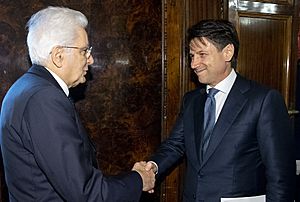
In February 2018, the leader of the Five Star Movement (M5S), Luigi Di Maio, suggested Conte for a government role. After the 2018 election, no single party or group had enough votes to form a government on its own. The M5S and the League decided to try and form a government together.
On May 21, Conte was proposed by both parties to be the prime minister. On May 23, he was asked by President Sergio Mattarella to form a new government. Conte said he would be the "defense lawyer of the Italian people."
However, on May 27, Conte resigned because of disagreements. The League wanted a specific person, Paolo Savona, to be the Minister of Economy. But President Mattarella did not agree, as Savona had strong views against the Euro currency. Mattarella said he could not allow Italy to leave the Eurozone.
After more talks, the M5S and the League agreed to form a government without Savona as finance minister. Conte was again chosen to lead it.
First Conte Government
On June 1, 2018, Giuseppe Conte officially became the new prime minister of Italy. His government included members from the M5S and the League, as well as some independent experts.
The leaders of the two main parties, Matteo Salvini (League) and Luigi Di Maio (M5S), both became Deputy Prime Ministers. Salvini became the Minister of the Interior, focusing on reducing illegal immigration. Di Maio became the Minister of Economic Development and Labour, working on introducing a universal basic income.
This government was often called the "Government of Change." This was because of a document that outlined the plans of the two parties.
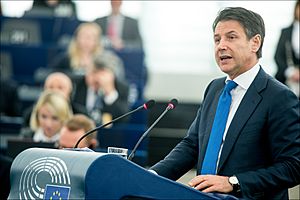
In his first speech, Conte said he wanted to reduce illegal immigration and fight against human traffickers. He also talked about fighting political corruption and reducing taxes. He also suggested lifting international sanctions against Russia.
The Italian Senate and the Chamber of Deputies both voted to support his government.
Resignation and Second Government
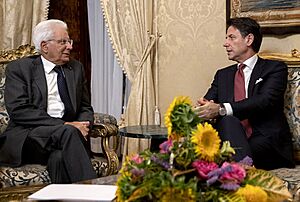
In August 2019, there were growing disagreements within the government. Deputy Prime Minister Salvini called for a vote of no confidence against Conte. Many thought Salvini wanted new elections to gain more power. On August 20, Conte resigned, saying the government was ending.
However, a new possibility emerged: the Five Star Movement and the Democratic Party decided to form a new government together. On August 28, the Democratic Party leader announced support for Conte to remain prime minister. President Mattarella then asked Conte to form a new cabinet.
On September 4, Conte announced his new ministers. The new government was approved by both the Chamber of Deputies and the Senate.
In December 2019, the Minister of Education resigned due to disagreements over the budget. Conte temporarily took over the role. He then decided to split the Ministry into two separate ministries: one for public education and one for universities and research.
2021 Government Crisis and Resignation
Between December 2020 and January 2021, disagreements grew between Conte and Matteo Renzi, the leader of Italia Viva. Renzi wanted big changes to the government's plans for economic recovery after the COVID-19 pandemic.
On January 13, Renzi announced that his party's two ministers were resigning. This caused Conte's government to collapse. Many members of Conte's cabinet supported him.
On January 18, the government won a vote of confidence in the Chamber of Deputies. The next day, Conte also won a vote in the Senate, but he did not have a strong majority. On January 26, after talks failed, Conte resigned as prime minister. He said that the country needed a government with stronger support to face the ongoing emergency.
President Mattarella then asked Mario Draghi, the former president of the European Central Bank, to form a new government. Conte met with Draghi and publicly supported him, asking his former coalition partners to join Draghi's government.
Key Policies and Actions
Economic Policies
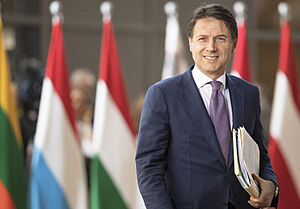
One of the main ideas of Conte's first government was to change the Italian tax system. They introduced a lower tax rate for small businesses and self-employed people. This "flat tax" was also kept by Conte's second government.
His first government also introduced the "citizens' income." This is a system that provides basic income and help finding a job for poor people and families. This program was also continued by his second government.
In September 2019, Conte launched a "Green New Deal" to address climate change and economic fairness. He praised students who protested for climate action, saying the government was committed to finding solutions.
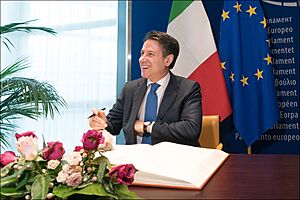
In April 2020, during the COVID-19 pandemic, Conte strongly supported the idea of issuing "Eurobonds." These are shared loans among European countries to help with the crisis. He argued that Europe needed to work together. In July 2020, Conte and other European leaders approved a large recovery package called Next Generation EU. Italy will receive a significant amount of money from this fund.
Immigration Policies
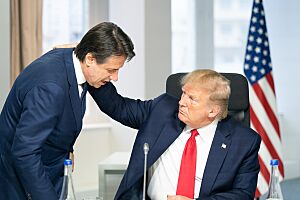
When Conte became prime minister in 2018, he quickly acted on promises to control immigration. Italy had received many migrants arriving by boat from Libya. Conte and his Interior Minister, Matteo Salvini, introduced stricter rules for immigration and public safety.
On June 10, 2018, Italian ports were closed to ships rescuing immigrants in the Mediterranean Sea. In September 2018, a "Salvini decree" was approved. This made it harder for migrants to get protection and easier for them to be sent back. This decree was later removed in December 2020.
In September 2019, Italy and four other European countries agreed on a plan to manage the migrant crisis and share those rescued from the Mediterranean. This was seen as a success for Conte.
Ponte Morandi Bridge Collapse
On August 14, 2018, a section of the Ponte Morandi bridge in Genoa collapsed during a rainstorm. Forty-three people died.
The day after, Conte declared a state of emergency for the region. He appointed the mayor of Genoa to oversee the bridge's reconstruction. The government also put pressure on the company that managed the highway, Autostrade of Italy (ASPI). There were calls to take away their license and have the state take over ASPI.
The old bridge was removed, and a new one, designed by architect Renzo Piano, was built. The new bridge, called Saint George Bridge, was opened on August 3, 2020, by Conte and President Mattarella.
Nationalization of the Highway Company
In July 2020, the government and Atlantia, the company that owned ASPI, reached an agreement. The state would take a majority share in ASPI, effectively taking control of the national highway company. Conte said that the government would not sacrifice public good for private interests.
Constitutional Reform
Under Conte's governments, the Italian Parliament approved a reform to reduce the number of members of parliament. The number of deputies would go from 630 to 400, and senators from 315 to 200.
Conte said this reform would make parliament work more efficiently and bring citizens closer to their government. The public voted on this reform in a referendum in September 2020, and nearly 70% voted in favor.
COVID-19 Pandemic Response
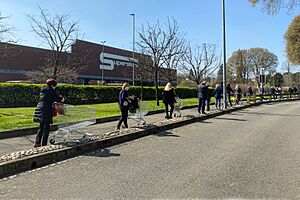
In February 2020, Italy became a major center for COVID-19 cases. The government quickly banned flights to and from China. On February 22, they announced a plan to quarantine people in affected areas in northern Italy. Schools and universities across the country were closed.
On March 8, 2020, Prime Minister Conte extended the quarantine to all of Lombardy and other northern provinces. The next day, he announced that these measures would apply to the entire country, putting 60 million people on lockdown. This was one of the largest lockdowns in history.
The lockdown measures were widely supported by the public. However, some saw them as a major restriction on constitutional rights. The Italian Constitution does allow for travel restrictions for health reasons.
On March 21, Conte announced even stricter rules, halting all non-essential production and businesses. On April 1, the lockdown was extended until April 13. On April 10, it was extended again until May 3, though some businesses were allowed to reopen.
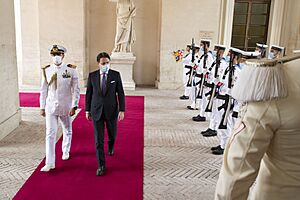
On April 26, Conte announced "Phase 2," which began on May 4. Travel between regions was still restricted, but movement within municipalities was allowed for work, health, or visiting relatives. Some factories reopened, but schools, bars, and restaurants remained closed.
On May 18, the lockdown officially ended, and bars, restaurants, and gyms were allowed to reopen. However, travel between regions was still limited.
In October 2020, cases began to rise again. The government extended the state of emergency. New restrictions were introduced, including limits on opening hours for bars and restaurants and mandatory mask use outdoors in some areas. On October 25, gyms, swimming pools, theaters, and cinemas were closed, and bars and restaurants had to close by 6 PM.
On November 4, 2020, Conte announced a new lockdown. The country was divided into three zones (red, orange, yellow) based on the severity of the pandemic. A national curfew was put in place from 10 PM to 5 AM. In red zones, measures were similar to the earlier national lockdown.
Further restrictions were put in place for the Christmas holidays, limiting movement between regions and within towns. On December 18, Conte announced that the entire country would be a "red zone" on Christmas Day and other holidays.
Foreign Policy
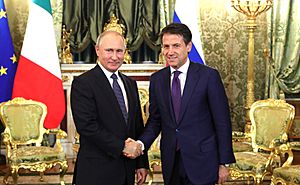
Conte's foreign policy was generally friendly towards Russia. He pushed for the removal of international sanctions against Russia, saying they hurt the Italian economy. However, he also stressed that Italy would remain a member of NATO and an ally of the United States.
Conte developed a close relationship with U.S. President Donald Trump. Trump often praised Conte and saw him as a key ally. Conte was the only leader at the 2018 G7 summit to support Trump's idea of letting Russia rejoin the G7.
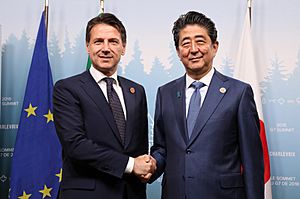
In March 2019, Conte and Chinese President Xi Jinping signed economic agreements in Rome. This included a plan for China's "Belt and Road Initiative" investments. Other Western countries criticized Italy's involvement in this program.

Conte also built a friendly relationship with Spanish Prime Minister Pedro Sánchez. They often shared similar views on economic issues, immigration, and climate change in Europe.
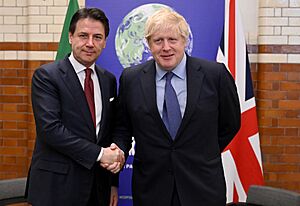
Conte criticized Turkey's military actions in north-eastern Syria in 2019. He said it put civilians and stability at risk.
In January 2020, the situation in the Libyan Civil War became serious. Conte met with the main leaders involved to try and find a solution.
After Being Prime Minister (2021–Present)
Leader of the Five Star Movement
On February 28, 2021, after his time as prime minister ended, Conte joined the Five Star Movement (M5S). The founder of the M5S, Beppe Grillo, asked Conte to write new rules for the party and become its new leader.
After some disagreements, Conte and Grillo reached a compromise. On August 5, 2021, Conte easily won the election to become the new president of the M5S.
In 2022, there were tensions within the M5S between Conte and Luigi Di Maio. They disagreed on government policies and other issues. In June 2022, Conte criticized the government's approach to the Russian invasion of Ukraine. Di Maio strongly defended it. On June 21, Di Maio and several other politicians left the M5S to form their own group.
On July 13, 2022, Conte announced that the M5S would no longer support Mario Draghi's government on a new economic plan. This caused a political crisis. Draghi resigned as prime minister, and new elections were called for September 25, 2022.
In the 2022 election, Conte's M5S ran alone and received 15.4% of the votes. Conte was elected to the Chamber of Deputies.
Personal Life
Conte was married to Valentina Fico, a lawyer, and they have a son named Niccolò, born in 2007. They later divorced. By 2018, Conte was engaged to Olivia Paladino.
He is a big fan of the A.S. Roma football team. Conte is a practicing Roman Catholic and a follower of Saint Pio of Pietralcina. He speaks both Italian and English.
Electoral History
| Election | House | Constituency | Party | Votes | Result | |
|---|---|---|---|---|---|---|
| 2022 | Chamber of Deputies | Lombardy 1 | M5S | – | ||
Images for kids
-
Conte during a press conference at the Quirinal Palace after accepting the task of forming a new cabinet
See also
 In Spanish: Giuseppe Conte para niños
In Spanish: Giuseppe Conte para niños
 | Delilah Pierce |
 | Gordon Parks |
 | Augusta Savage |
 | Charles Ethan Porter |


